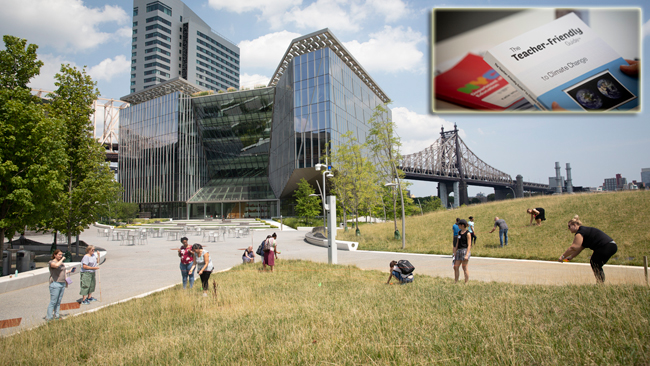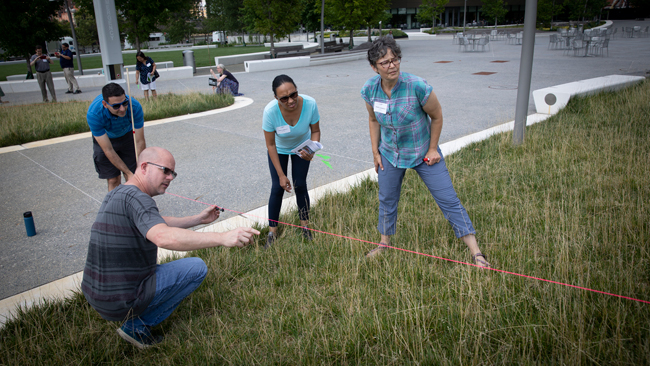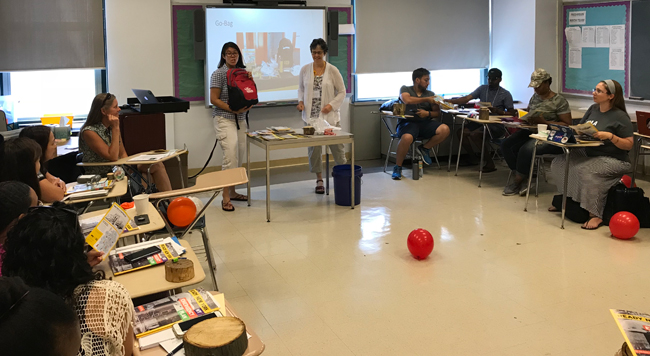— By Ryan Strother, Marine District Freelance Writer, New York Sea Grant
Contacts:
Helen Cheng, NYSG’s Coastal Resilience Specialist, E: helen.cheng@cornell.edu, P: (718) 951-5415
Nordica Holochuck, New York Sea Grant, Hudson Estuary Specialist, E: nch8@cornell.edu, P: (845) 340-3983

In early August 2018, New York Sea Grant conducted
a climate-themed training for educators at CornellTech, Roosevelt
Island, NYC during the STEM Institute teacher professional development
training. (Inset) The book “The Teacher-Friendly Guide to Climate
Change,” has reached 50,000 educators, including every public high
school science teacher in New York City and two-thirds of all science
teachers in New York state. Credit: Jason Koski/University Photography.
New York, NY, October 8, 2019 - New York Sea Grant (NYSG), in partnership with the Paleontological Research Institution, hosted a two-day workshop in early August for New York City teachers during the STEM (Science, Technology, Engineering and Mathematics) Institute Teacher Professional Development event.
Entitled, “Climate To-Go,” the three-day workshop introduced 20 teachers from K-12 public schools across New York City to climate change issues, extreme weather preparedness, and teaching methods for sharing climate science with their students. The partnership was born out of a crowd funding campaign to bring climate science to every high school in the U.S.
The New York City Department of Education created the STEM Institute to give teams of teachers the opportunity to develop a shared understanding of the program’s important features while also deepening their understanding and approaches to STEM Education. The Climate To-Go section of the program incorporates climate education into these objectives.
The first day of the collaborative workshop focused on the effects of carbon dioxide (CO2) on the Earth’s energy balance. Teachers dug into the issues putting pressure on Earth’s climate system and reviewed important factors for maintaining a habitable climate. By the end of the day, the educators learned to explain how CO2 emissions lead to trapping heat in the atmosphere and were able to explain how the earth’s energy balance works.
“During our unit on climate change in school last year, we struggled with the lab we did with students,” said one teacher in an exit survey for the training. “I liked how all of [today’s] materials were easy to obtain and how the presenter compared experimental results to real life.”
Participating teachers then spent the next day touring Cornell Tech’s campus located on Roosevelt Island. The new facilities were designed and constructed to be responsive to the new risks and needs of a coastal city vulnerable to climate change.
Nordica Holochuck, NYSG’s Hudson Estuary Specialist, led the teachers through an activity from the NYSG Climate Change Lesson Plan Project, called “NY Explores Sea Level Rise.” Teachers worked in small groups, using simple surveying methods to help visualize projected future shorelines.

Nordica Holochuck leads teachers through a sea level rise visualization activity. Credit: Jason Koski, Cornell University Photography.
The final day of the event helped teachers explain strategies for mitigating carbon emissions from large-scale energy use. The teachers examined strategies for resilience against major effects of climate change impacting New York City.
As part of the climate resilience education, Helen Cheng, NYSG’s Coastal Resilience Specialist, and Holochuck introduced Climate-to-Go bags. The bags serve as an example of what to pack in a climate go-bag, and contained several elements of a climate go-bag as recommended by NYC Emergency Management: a water bottle, non-perishable food, a waterproof container, a flashlight, first-aid kit, a thumb drive, and a Mylar blanket—all with attached educational explanations.

Helen Cheng (left) and Nordica Holochuck (right) introduce Climate-to-go bags. Credit: Ryan Strother.
Also included in the bag is the Teacher-Friendly Guide to Climate Change, a curriculum written for teachers including the basics of climate change science and perspectives on teaching the subject.
“This workshop provided numerous resources and approaches to climate change,” said another educator in attendance at the teacher-training event. “This has allowed me to rethink how I can teach my kids what they need to know and what they can do.”
More Info: New York Sea Grant
New York Sea Grant (NYSG), a cooperative program of Cornell University
and the State University of New York (SUNY), is one of 33 university-based
programs under the National Oceanic and Atmospheric Administration’s
National Sea Grant College Program.
Since 1971, NYSG has represented a statewide network of integrated
research, education and extension services promoting coastal community
economic vitality, environmental sustainability and citizen awareness
and understanding about the State’s marine and Great Lakes resources.
Through NYSG’s efforts, the combined talents of university scientists
and extension specialists help develop and transfer science-based
information to many coastal user groups—businesses and industries,
federal, state and local government decision-makers and agency managers,
educators, the media and the interested public.
The program maintains Great Lakes offices at Cornell University, SUNY
Buffalo, SUNY Oswego and the Wayne County Cooperative Extension office
in Newark. In the State's marine waters, NYSG has offices at Stony Brook
University in Long Island, Brooklyn College and Cornell Cooperative
Extension in NYC and Kingston in the Hudson Valley.
For updates on Sea Grant activities: www.nyseagrant.org has RSS, Facebook, Twitter, and YouTube links. NYSG offers a free e-list sign up via www.nyseagrant.org/nycoastlines for its flagship publication, NY Coastlines/Currents, which is published quarterly. Our program also produces an occasional e-newsletter,"NOAA Sea Grant's Social Media Review," via its blog, www.nyseagrant.org/blog.